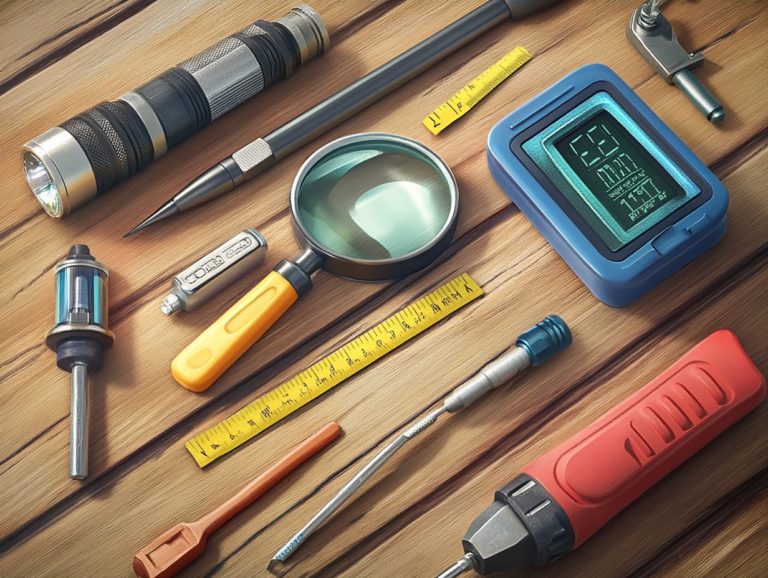Essential Inspection Tips for First-Time Buyers
Buying your first home is an exhilarating adventure, yet it can easily feel overwhelming at times. One vital aspect that often slips through the cracks is the home inspection.
This guide arms you with everything you need to know about home inspections: their purpose, benefits, and what to anticipate during the process. You ll discover key areas to inspect, red flags to look out for, essential questions to pose to your inspector, and how to interpret the findings in your report.
Equip yourself with this knowledge to make confident decisions as you embark on the journey of homeownership.
Contents
- Key Takeaways:
- The Importance of Home Inspections for First-Time Buyers
- What to Expect During a Home Inspection
- Key Areas to Inspect
- Red Flags to Look Out For
- Key Questions for Your Home Inspector
- Interpreting the Inspection Report
- Frequently Asked Questions
- What are some essential inspection tips for first-time buyers?
- Why is a home inspection important for first-time buyers?
- What are some common areas that first-time buyers should pay attention to during an inspection?
- Can a first-time buyer negotiate repairs based on the inspection?
- Should first-time buyers attend the inspection?
- How much does a home inspection typically cost for first-time buyers?
Key Takeaways:

Home inspections are crucial for first-time buyers as they help identify potential problems and ensure the property is safe and functional. During a home inspection, buyers should pay attention to the structural, electrical, and plumbing systems and ask questions to gain a better understanding of the property.
It is important to carefully review and interpret the inspection report to make informed decisions and negotiate repairs or credits with the seller.
The Importance of Home Inspections for First-Time Buyers
For first-time homebuyers, understanding why home inspections matter is an essential part of the home-buying journey. This step confirms the property is in good condition and offers valuable insights into potential future issues.
A home inspection, carried out by a qualified inspector, thoroughly examines critical elements of the property, such as the overall strength and stability of the building, electrical systems, and plumbing.
This comprehensive evaluation gives you the power to make informed decisions and negotiate repairs with confidence.
Understanding the Purpose and Benefits
Home inspections reveal safety hazards and hidden issues, allowing you to make informed decisions. When you enlist professionals to assess the property, you gain access to critical information, including the presence of environmental contaminants like mold or radon, which can pose serious health risks.
Inspections also check if ventilation systems work properly, enhancing both comfort and safety in your new home.
Armed with a comprehensive report, you are equipped to negotiate necessary repairs or adjustments to the purchase agreement, ultimately leading to a more secure and satisfying investment.
What to Expect During a Home Inspection
Knowing what to expect during a home inspection will empower you as a buyer. Expect a thorough evaluation during the inspection, conducted by a qualified inspector who adheres to a detailed checklist.
Being informed allows you to navigate this important step with confidence and clarity.
Step-by-Step Process and Timeline
The step-by-step process of a home inspection begins with you coordinating with a qualified inspector to schedule an appointment. This is followed by an on-site examination, which can take several hours depending on the size of the property.
After scheduling, it s advantageous for you to prepare by compiling a list of specific concerns, such as previous repairs or unusual odors, to share with the inspector.
During the on-site inspection, the inspector will evaluate key systems, including plumbing, electrical, and structural components, taking detailed notes and photographs along the way.
You are encouraged to accompany the inspector, as this offers you the opportunity for real-time clarification of findings. Once the inspection wraps up, the inspector will generate a comprehensive report, typically within a few days, summarizing observations and any issues discovered.
This report becomes an invaluable tool for you when negotiating repairs or considering further inspections.
Key Areas to Inspect

When you conduct a home inspection, there are several key areas that demand your thorough evaluation. This meticulous approach ensures the property not only meets safety standards but is also free from major repairs that could lead to significant costs down the line for you as the home buyer.
Structural, Electrical, and Plumbing Systems
The structural integrity of a home, along with the functionality of its electrical and plumbing systems, are critical elements you must examine during a detailed home inspection to ensure both safety and compliance with local building codes.
By prioritizing these evaluations, you gain valuable insight into the property’s overall condition. This helps you uncover necessary repairs that might otherwise slip through the cracks.
Inspecting walls and foundations allows you to identify issues like cracks or shifting. The electrical panel should be scrutinized for outdated wiring or faulty components that could present safety hazards.
Similarly, a careful assessment of the plumbing for leaks or other concerns is essential. Undetected problems can lead to extensive damage and costly repairs down the line.
These detailed checks not only empower you to make informed decisions but also help you avoid unexpected expenses after your purchase.
Red Flags to Look Out For
Stay alert for these warning signs! During a home inspection, look for signs of termite damage, foundation problems, and other safety hazards that could jeopardize the integrity of the home.
Being vigilant in this process can save you from future headaches and ensure a sound investment.
Signs of Potential Problems
As a home buyer, you need to be vigilant for signs of potential problems like mold, radon, termite damage, and other environmental contaminants that could pose serious health risks and financial burdens if overlooked.
Don t ignore these signs; they can save you big trouble later!
Pay close attention to common indicators, such as unusual or persistent musty odors, which can hint at hidden mold growth. Additionally, visible signs of water damage or excessive dampness shouldn’t escape your notice.
Damage to structures like wood or drywall may indicate deeper issues that require immediate attention. By recognizing these red flags early, you arm yourself with the essential knowledge needed to ask the right questions and negotiate necessary repairs.
Understanding these potential hazards empowers you to ensure your new home is safe and sound, ultimately protecting both your well-being and your financial investment.
Key Questions for Your Home Inspector
Asking the right questions during a home inspection is essential for first-time homebuyers. It helps you clarify any concerns and gain a comprehensive understanding of the inspection report, ultimately enhancing your confidence in the purchasing decision.
Clarifying Concerns and Gathering Information

During the home inspection, it s essential to address any concerns with the inspector to ensure you fully grasp the detailed report that follows.
Talk with the inspector to promote an open dialogue and get real-time explanations of findings and recommendations. This proactive stance can help make sense of complex terminology, ensuring you leave the inspection with a clear understanding of what lies ahead.
By voicing your concerns as they come up, you’ll gain invaluable insights into necessary repairs or potential safety issues, leading to a more knowledge-based decision-making process.
Working together with the inspector uncovers important details that could significantly impact your future investment.
Interpreting the Inspection Report
Interpreting the inspection report is an essential step for you as a home buyer. This document consolidates the findings from the home inspection into a structured format, clearly outlining areas of concern and providing recommendations for repairs or further evaluations.
Understanding these insights empowers you to make informed decisions about your prospective home.
Understanding the Findings and Next Steps
Finding out what s wrong with a home can save you a lot of money later! Understanding the findings from the inspection report is crucial for you as a buyer to determine your next steps. This may involve negotiating repairs with the seller, fixing safety issues, or planning for future home maintenance.
By carefully assessing the highlighted issues, you can prioritize repairs that affect livability and safety. This ensures that your new home is a sound investment. It s essential to stay proactive; addressing these concerns early can prevent larger, more costly problems down the road.
Consider talking to experts for specific repairs and obtaining estimates to guide your negotiations. This strategy not only gives you power during the purchasing process but also lays a strong foundation for your long-term success in homeownership. It ensures you’re well-prepared for future maintenance.
Frequently Asked Questions
What are some essential inspection tips for first-time buyers?
A few important tips for first-time buyers to keep in mind during a home inspection are:
- Research the property and neighborhood before the inspection.
- Be present for the inspection and ask questions.
- Take detailed notes and photos of any issues or concerns.
- Consider hiring a professional inspector for a thorough and unbiased evaluation.
- Pay attention to potential red flags such as water damage, pest infestations, and faulty electrical or plumbing systems.
- Be prepared for potential additional costs for repairs or renovations.
Why is a home inspection important for first-time buyers?

A home inspection can provide peace of mind for first-time buyers by identifying any major issues or safety concerns with the property before purchase. It can also reveal any potential maintenance or repair costs that buyers may not have been aware of, allowing them to make a more informed decision.
What are some common areas that first-time buyers should pay attention to during an inspection?
Some key areas to keep an eye on during a home inspection include:
- The foundation and structural integrity of the property.
- The roof, including any signs of water damage or leaks.
- The HVAC system, to ensure it is in good working condition.
- The plumbing and electrical systems, for potential safety hazards.
- The condition of the windows, doors, and insulation for energy efficiency.
- The presence of any pests or infestations.
Can a first-time buyer negotiate repairs based on the inspection?
Yes, after the inspection, buyers can request the seller to make repairs or negotiate the price based on any issues that were uncovered. However, it is important to keep in mind that the seller is not obligated to make any repairs, and negotiations may vary depending on the real estate market and contract terms.
Should first-time buyers attend the inspection?
It is highly recommended for first-time buyers to attend the inspection. This allows them to get a better understanding of the property, ask questions, and receive important information or recommendations from the inspector. Buyers can take the chance to familiarize themselves with the property and its features.
How much does a home inspection typically cost for first-time buyers?
The cost of a home inspection can vary depending on the location, size, and condition of the property. On average, first-time buyers can expect to pay anywhere from $300 to $500 for a home inspection. However, investing in an inspection now can save you from high repair costs later, making this expense well worth it for the peace of mind and potential savings in the long run.






